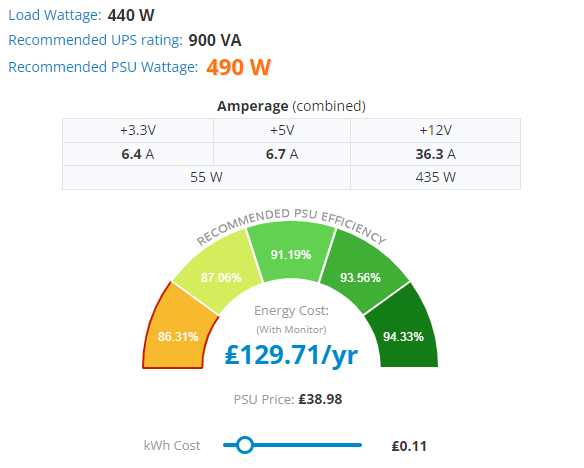A power supply unit (PSU) is perhaps the most overlooked piece of hardware in a build, and is usually chosen based on the amount of power the processor, graphics card and other components will draw. The form factor, physical dimensions and all other specifications are rarely given much of a second glance, considering the ATX form factor is such a popular size, and there is no shortage of quality PSUs for tower, mid-tower and full tower builds.
When you're building a Mini-ITX (sometimes called m-ITX or just ITX) PC, however, the PSU is actually given much more thought. For one thing, it has to fit in your compact case. A tiny PC has a few benefits, not least taking up less room than its larger ATX cousins; m-ATX cases are portable, and can cost less overall. Although your graphics card options are limited, and airflow/cooling needs to be a priority, there's a lot of reasons you'd choose to build a tiny PC over a stodgy ATX.
This article will guide you to selecting the best PSU for your Mini-ITX build, whether that is for gaming, creative work or just a home office PC.
What PSU do I need for a Mini-ITX build?
The usual rules apply when choosing a PSU for your Mini-ITX case, which means you need to make sure your motherboard, processor, graphics card and other components get the required power. You can figure this our quite easily using a PSU calculator like Outervision's Power Supply Calculator.

Using this handy tool, we can determine that a mini PC build that houses an Raptor Lake 13th-Gen Intel Core i5-13600K processor, a stodgy NVIDIA RTX 3070, NVMe SSD, and 2x 16GB DDR5 RAM will use approximately 440W if we're gaming for a couple of hours a day, and working for 8 hours a day on it. That being the case, we will need a minimum 500W power supply unit to power our components. To give yourself a little more headroom for overclocking and absolutely maxing out your USBs, we could opt for future-proofing the specification with a Silverstone SX650-G 650W Modular Power Supply 80 Plus Gold PSU, which will more than handle everything you throw at it in a Mini-ITX build. Moreover, it will handle the heat (from the confined space) much better, and dissipate it using Silverstone's 92mm FDB fan and modular design.
Remember, your choice of components will determine the wattage you require, so if you choose less demanding processor and graphics card, you can get away with a lower wattage ATX or SFX PSU. AMD have been focused on reducing TDP (Thermal Design Power) for many years, and Intel have often been found wanting in power consumption tests. That is less apparent in the newer Intel chips like Raptor Lake and Alder Lake, when compared with Ryzen 7000 - but older CPUs will certainly see the pendulum swing AMD's way.
Intel's 11th-Gen processors, when compared with AMD's Ryzen 7 CPUs, are power hungry beasts that will suck a lot more energy. For instance, the AMD Ryzen 7 5800X vs. Intel Core i7-11700K, the 11700K draws much more power than the Ryzen chip, meaning you will require a robust Mini-ITX motherboard with intelligent VRMs to handle power consumption, as well as a solid PSU to boot.
Of course, there's also a way to mitigate the thermal issues that arise from overpowered processors. A cooling system that is designed for Mini-ITX cases, such as the Noctua NH-L9i Intel-only Low Profile Quiet CPU Cooler and similar low profile AMD AM4 coolers, offer excellent cooling and noise reduction, whilst being compact enough to sit comfortably in a Mini-ITX build.
This information is extremely useful in finding out exactly what power you need, but what PSU size - or form factor - do you need?
The most common PSU form factor used in a Mini-ITX case is the SFX form factor. This form factor is designed to be small and compact, which obviously makes it perfect for use in a Mini-ITX case. The SFX PSU typically has a length of 125mm and a height of 63.5mm, making it much smaller than the traditional ATX format. SFX PSUs are also capable of an 80Plus efficiency rating, which brings them in line with the same efficiencies you can expect in ATX PSUs. Naturally, you will find that SFX PSUs are just as capable capable of providing adequate power for even the most demanding gaming PCs and tiny creator workstations, making them an ideal choice for anyone looking to build their own Mini-ITX system. SFX power has few limitations when compared with ATX, and we have SFX power supplies up to 750W available at CCL.
The idea is that smaller systems consume less power, but if your components need extra power (looking at you, Intel 12th-Gen and NVIDIA 40-series) an ATX power supply unit is the way to go. This will mean you need to choose a m-ITX case that accepts an ATX form factor power supply unit.
Will any size PSU fit in a Mini-ITX case?
The short answer is: not exactly. You can choose a smaller form factor with an SFX PSU, but the majority of Mini-ITX cases have enough room for an ATX power supply unit. Take the Fractal Design Define Nano S ITX case, for example. This case is designed for gaming specifications, and an ATX power supply will work just fine in the tiny, tiny space.
But if we take a look at the area where the PSU will sit in the chassis (the gap at the bottom), we can see that an SFX PSU would leave a gap where the ATX PSU would fit perfectly. In essence, you need to choose the PSU in line with what PSU your case accepts. If you're looking at installing an RTX 4090 in a mini gaming PC build, then you have a couple of bridges to cross, as you can see from Optimum Tech's build below: -
The first thing you notice is that the GPU barely fits in the Formd T1 case. This immediately gives rise to concerns around thermal efficiency and the potential for overheating. The next thing you'll realise is that an RTX 4090 requires a PSU wattage of around 850W to get enough power alongside a gaming processor - and that means it will be sensible to use an ATX power supply unit with 12VHPWR power connector.
Which PSUs are best for a Mini-ITX gaming PC?
On to the meat of this article, and we can look at the best options for your Mini-ITX build. As we've learned, the PSU form factor is dependent on your case choice, so we're going to look at both ATX and SFX form factors, just in case you chose a PC case that has this specification requirement.
Best ATX PSUs for Mini-ITX
Seasonic B12 BC Series 850W Power Supply 80 Plus Bronze
Features:
- 3x Molex Connectors
- 6x SATA Connectors
- 4x PCIe Connectors (6+2-Pin)
- 4+4+8-Pin CPU Power Connector
- ATX Form Factor
The real benefit with Seasonic PSUs is the intelligent thermal circuit feature, which is primarily designed to determine the most optimal balance between cooling and noise reduction. With thermals being the primary concern in a Mini-ITX build, it is essential that you use a PSU that has this at the top of the feature list. Seasonic, though veterans in the PSU world, maintain a low price on the B12 by reducing the number of connectors - though for most tiny gaming rigs, 850W and thermal optimisation is more than enough benefits.
Corsair RM Series RM650 650W Modular Power Supply 80 Plus Gold
Features:
- 4x Molex Connectors
- 10x SATA Connectors
- 4x PCIe Connectors (6+2-Pin)
- 4+4+8-Pin CPU Power Connector
- ATX Form Factor
Naturally, with the ATX form factor, you are gaining an advantage as far as the number of connections, and this will be of significance to those building a Mini-ITX media server, for example. Having 10x SATA connectors is ideal. Overall, the Corsair RM650 stands out as a great value PSU that offers amazing efficiencies (80 Plus Gold), and will remain cool thanks to Corsair's intelligent Zero-RPM mode and fan control systems that kick in when needed.
EVGA SuperNOVA 650 GT 650W Modular Power Supply 80 Plus Gold
Features:
- 3x Molex Connectors
- 6x SATA Connectors
- 3x PCIe Connectors (6+2-Pin)
- 4+4-Pin CPU Power Connector
- ATX Form Factor
EVGA are popular Mini-ITX PSUs thanks to their great value for money, and high efficiency. You will benefit from the fully modular design, and Auto ECO Mode that means the fan RPM adapts automatically to the PSU temperature. The fan shuts off when in a low temperature/low load situation, which also results in reduced noise. Although having less connections than a Corsair RM650, you will save a little money with the EVGA SuperNOVA.
Best SFX PSUs for Mini-ITX
Silverstone SX700-G 700W Modular Power Supply 80 Plus Gold
Features:
- 3x Molex Connectors
- 6x SATA Connectors
- 4x PCIe Connectors (6+2-Pin)
- 4+4+8-Pin CPU Power Connector
- SFX Form Factor
The Silverstone SX700-G is suitable for most Mini-ITX builds, with a decent wattage for gaming specs and more than enough to power a tiny home PC. The SX700-G is fully modular, so allows for excellent cable management and reduction of heat around the unit, which is good news for those looking to reduce thermal output.
Silverstone SX650-G 650W Modular Power Supply 80 Plus Gold
Features:
- 3x Molex Connectors
- 6x SATA Connectors
- 4x PCIe Connectors (6+2-Pin)
- 4+4+8-Pin CPU Power Connector
- SFX Form Factor
Much the same as the SX700-G, the Silverstone SX650-G 650W offers modular connectors, and the same connections (just with less output wattage). Perfect for small home builds, media centres and entry level gaming PCs with a smaller footprint.
Summary
Hopefully this guide has given you the best options for your PSU choice when it comes to Mini-ITX builds. Regardless of what many "experts" will tell you, it is more than possible to build a cool and powerful Mini-ITX PC for gaming, creative work, or as a media centre - it just takes a little more time figuring out the components you'll need. Whilst a processor that has a high power draw will mean a higher PSU wattage and higher temperatures, this can also be mitigated by choosing an optimal cooling solution, as we spoke about above.
So, in summary, both ATX and SFX PSUs are suitable for a Mini-ITX build, though there are considerations when it comes to other components, and the power consumption they require.







